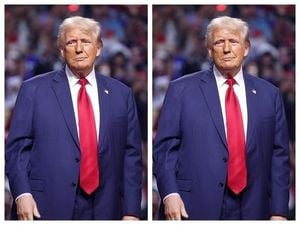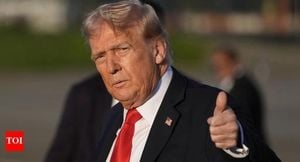With Donald Trump back on the political scene, one of the most startling moves he's made during this new chapter is tapping Robert F. Kennedy Jr. to take the helm of the U.S. Department of Health and Human Services. This announcement has raised eyebrows everywhere, from Washington D.C. to the small towns across America. Kennedy, known for his strong opinions on health, particularly his skepticism surrounding vaccines and advocacy against fluoride, is already on the radar of experts.
Critics are quick to voice their concerns over this potential appointment. RFK Jr.'s stance on vaccines has been polarizing, leading to significant backlash from both medical professionals and public health advocates. His views are largely seen as contrary to the prevailing scientific consensus on the importance of vaccines in preventing diseases. Many worry this nomination could mean shifting U.S. health policy away from evidence-based practices.
Let's break this down: Kennedy had long been associated with vaccine skepticism, which has inevitably influenced public opinion. The American Academy of Pediatrics, among various scientific organizations, has condemned such views as harmful. Dr. Amesh Adalja, who specializes in infectious disease, asserts, "Appointing someone with such anti-science views to oversee public health is akin to putting the fox in charge of the henhouse." This metaphor paints quite the picture of what many fear could happen if Kennedy were to take over as the Health Secretary.
But RFK Jr. isn’t just about vaccines; he’s also made headlines with his fervent opposition to fluoride, claiming it’s harmful to humans. His push to have fluoride removed from the public water supply is gaining traction among various anti-fluoride campaigns. A recent petition, championed by supporters of Kennedy, circulated urging municipalities to stop fluoridation. While some commend this endeavor as advancing public safety, scientists have raised alarms about the potentially dangerous consequences of such measures. According to multiple studies, fluoride has been proven beneficial, reducing tooth decay rates significantly over the last several decades.
Health historians and analysts are scrambling to understand what this new direction means for the future of America’s health policies. Kennedy's influence could not only affect traditional public health measures but also realign funding priorities. His noted distaste for certain pharmaceutical interventions through his public statements adds another layer to the debate, potentially impacting everything from childhood vaccination schedules to the way we manage public health crises.
What Does the Public Think?
Public reception to this potential appointment is as divided as Kennedy's opinions. While there are solid followers who support his candidacy, bolstered by his family's legacy, there are also many who find the choice alarming. Town hall meetings around the nation are erupting with debates as community leaders and citizens alike express varying degrees of cautious optimism and outright fear about the health impacts.
RFK Jr. has undeniably sparked discontent among parents and advocates for children’s health. People are asking whether it’s wise to put someone like him, who has openly challenged scientific recommendations, at the forefront of health policy. Will the public feel safe handing over responsibility for health regulations to someone with such controversial views? These are the questions echoing through channels from social media to mainstream news outlets.
Potential Consequences for Public Health
Healthcare experts have speculated about the long-term consequences of Kennedy’s leadership on health measures. Implementing anti-scientific trends could reverse years of progress made against rampant health crises. Public health officials warn of the danger present when personal beliefs overshadow research-based practices.
Some experts urge the public to maintain vigilance. They highlight the importance of listening to the voices of professionals within the field of health sciences. Dr. Claire Pomeroy, president of the Albert and Mary Lasker Foundation, cautions, "It’s imperative for us to support health policies grounded on scientific evidence. Our communities depend on them." If RFK Jr. prioritizes his personal views over established medical research, the fallout could last for generations.
A Look at the Confirmation Process
If RFK Jr. is formally nominated, his confirmation could lead to intense scrutiny. The hearings are likely to draw attention not just to his appointments but also to his past comments and their repercussions on health initiatives. During this process, experts from various fields will undoubtedly come forward to share their stance on the matter. Expect passionate debate on both sides as various stakeholders from the government, healthcare, and the public press for answers.
Traditionally, such appointments can make or break careers, shaped by not just political but also public scrutiny. Each statement Kennedy has made, and every action he has taken, will likely be dissected as part of this process. Supporters argue this is necessary to bring fresh perspectives to outdated policies, yet opponents fight back, insisting it jeopardizes health for Americans.
Broader Implications
The ramifications of this appointment could ripple beyond just individual health policies. If Kennedy promotes significant changes, we might witness shifts not only locally but nationally. Already, municipalities are reconsidering their stances on fluoride thanks to his advocacy. His office could make discussions about opioid prescriptions, preventative care, and mental health programs set societal norms.
Health communities are apprehensive about how political views could reshape funding for public health initiatives. With potential alterations to foundational frameworks, healthcare coverage, and scientific funding, it’s easy to see why skepticism reels through the industry.
The Final Word
Robert F. Kennedy Jr.’s potential appointment as the head of U.S. health policy raises pressing questions about the future direction of American healthcare. With his history of controversial statements and views, it remains uncertain how his leadership would mold the establishment and perception of health regulations. The question on everyone’s lips is straightforward yet heavy: Can the health of millions be safely placed in the hands of someone who has publicly challenged the fundamental tenets of scientific health policy? Only time will tell, but certainly, this story bears watching as it evolves.



